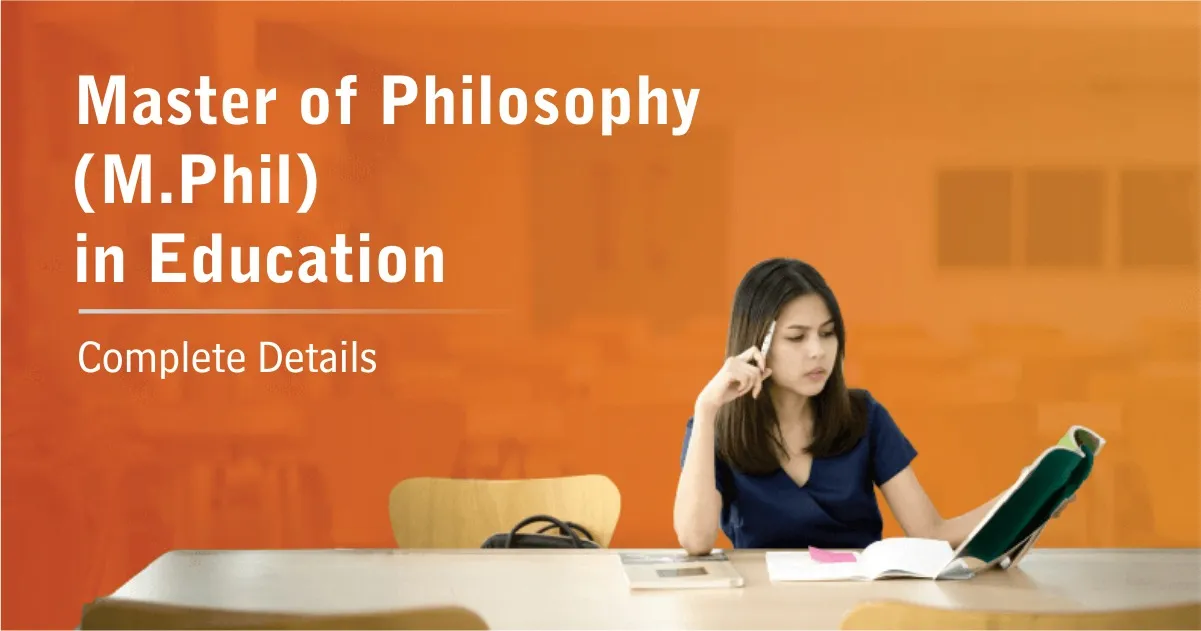A Master of Philosophy (M.Phil) in Education is an advanced postgraduate degree that focuses
on rigorous research and scholarly work in the field of education. This blog provides an
in-depth exploration of the M.Phil program in Education, covering its significance,
eligibility criteria, duration, coursework, research opportunities, and career prospects.
Significance of M.Phil in Education
The M.Phil in Education is designed for individuals who have a keen interest in educational
research and aspire to contribute to the academic discourse in education. It provides a
platform for students to delve deep into specific areas of educational theory, policy, and
practice through rigorous research and critical analysis.
Eligibility Criteria
To pursue an M.Phil in Education, candidates typically need to meet the following eligibility
criteria:
- Educational Qualification: A Master’s degree in Education or a
related field from a recognized university, with a minimum aggregate score as required
by the institution.
- Entrance Exam: Some universities may require candidates to clear an
entrance exam specific to the M.Phil program.
- Research Proposal: Often, candidates are required to submit a research
proposal outlining their intended area of research and methodology.
Duration and Structure
The duration of an M.Phil in Education program is generally 1-2 years, depending on the
university and the mode of study (full-time or part-time). The program typically includes:
- Coursework: Advanced courses in educational research methods,
educational theories, and specialized areas of study.
- Research Work: Conducting original research under the guidance of a
faculty supervisor, leading to the submission of a dissertation or thesis.
Coursework
The coursework in an M.Phil in Education program may include:
- Research Methodology: Training in qualitative and quantitative research
methods, data analysis, and literature review.
- Advanced Educational Theories: Exploration of contemporary educational
theories and their application in educational practice and policy.
- Specialized Seminars: Participation in seminars and workshops focusing
on specific topics in education, such as curriculum development, educational psychology,
and inclusive education.
Research Opportunities
One of the primary components of an M.Phil in Education is the research component, which
allows students to conduct in-depth research on a chosen topic of interest. Research
opportunities include:
- Dissertation: Writing a dissertation based on original research, which
contributes new insights or solutions to existing educational issues.
- Fieldwork and Data Collection: Conducting fieldwork, surveys,
interviews, or experiments to gather data relevant to the research topic.
- Publication: Publishing research findings in academic journals or
presenting them at conferences to contribute to the field of educational research.
Career Prospects
Graduates of an M.Phil in Education program have a wide range of career opportunities,
including:
- Academic Researcher: Pursuing a career in educational research
institutes, universities, or think tanks.
- Educational Consultant: Providing expert advice to educational
institutions, government agencies, and non-governmental organizations (NGOs) on
educational policies and practices.
- Policy Analyst: Contributing to the development and evaluation of
educational policies at local, national, or international levels.
- Curriculum Developer: Designing and implementing educational curricula
and programs for schools and educational organizations.
- Teacher Educator: Training and mentoring future educators in colleges
of education or teacher training institutes.
Conclusion
A Master of Philosophy (M.Phil) in Education offers a rigorous academic journey for those
passionate about advancing knowledge in the field of education. Through intensive research
and scholarly inquiry, students gain valuable insights into educational theories, policies,
and practices, preparing them for impactful careers as researchers, consultants, educators,
and policy analysts. If you are driven by a desire to contribute to educational innovation
and improvement, pursuing an M.Phil in Education could be the next step towards fulfilling
your professional aspirations.
